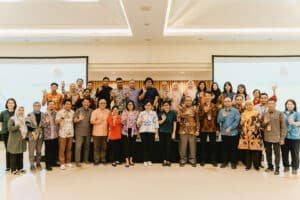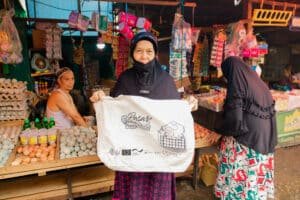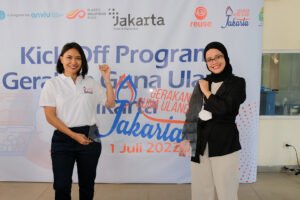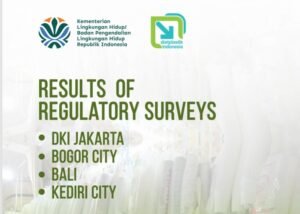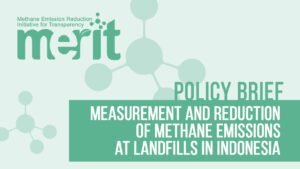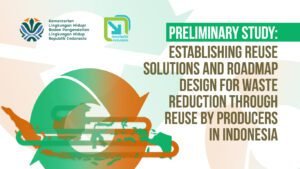Jakarta, 11 January 2024. In February 2022, the fifth session of The United Nations Environment Assembly (UNEA-5.2) produced a historic resolution in the form of ideas for the development of binding international legal instruments regarding plastic pollution, including in the marine environment. This legal instrument, known as the “Global Plastic Agreement”, will be based on a comprehensive approach that addresses the entire plastic life cycle and is expected to be agreed upon by the end of 2024. To make this ambition a success and coincide with the momentum of International Zero Waste Month, Diet Plastik Indonesia together with GAIA Asia Pacific is running a Reuse Tour and Conference with the theme “Reuse Now, Brighter Future Yes!”.
The conference activities which were attended by GAIA Asia Pacific members from various countries were divided into 4 plenary sessions with discussion themes including, how to form a global reuse system, good practices for reuse systems that have been implemented in Southeast Asia, good practices for reuse systems on islands -small islands, and what are the plans for developing reuse systems in Indonesia. This conference session aims to share experiences and transfer knowledge to create greater impact through advocacy and implementation of reuse systems, especially in Southeast Asia. Apart from that, this activity also seeks to build stronger partnerships to build reuse solutions.
In contrast to single-use plastic, re-use is a system that intentionally designs products and packaging for multiple life cycles. More than that, reuse offers economic benefits to society while reducing the environmental impact of our consumption. Attended by governments, civil society organizations, business actors, as well as other relevant institutions and stakeholders, this conference discussed how reuse can be highlighted as an emissions-friendly global solution to overcome the global waste problem.
This is in line with Froilan Grate as GAIA Asia Pacific Regional Coordinator. “Why reuse? Reuse systems are accessible, affordable, and make people’s lives easier. Although the transitioning from single use plastics (SUPs) takes time, the transition process should be clear, just, and grounded in shared principles, cross-sector collaboration, and place-based solutions. We know that working on a full reuse system that would have the impact to be able to address the scale of the plastic pollution crisis is still very much a work in progress – it is worth celebrating the amazing work that’s already happening here in Indonesia.”
The same thing was also conveyed by Tiza Mafira, Executive Director of Diet Plastik Indonesia, “By reusing, we can produce much lower emissions because we reduce plastic production from raw and recycled materials, so there is no waste in final disposal. “If standardization is carried out, reuse is claimed to be able to reduce greenhouse gas emissions for consumer packaging by up to 80 percent.”
To support the increasingly mature reuse system, greater support is needed in each city, even on the scale of state support. Therefore, through the momentum of the 2024 Reuse Conference in Jakarta, Diet Plastik Indonesia and GAIA Asia Pacific conducted a soft launch of the Asia Reuse Consortium.
This consortium, which has initial founding members from Indonesia, the Philippines and Vietnam, is the first step in reaching the pioneers of the reuse movement in Asia and making reuse solutions more widely adopted. This is in line with the spirit expressed by Break Free From Plastic (BFFP), a global movement to create a future without plastic pollution. “We must make the moment last, but this is not a moment. This is a movement. As such, we do not only have CSOs, we have local governments and business players, and we believe that the Consortium is really important for the region. Indonesia, along with other Asian countries, is leading the way and with that, the reuse revolution is bound to happen.” Explained Faye V Ferrer, BFFP South East Asia Network Organizer.
The hope is that not only Indonesia can be the driving force of this movement, but it can attract more countries in Asia to commit to joining the Asia Reuse Consortium. So that the reuse movement can be made a priority solution to single-use plastic pollution.
About Diet Plastik Indonesia
Diet Plastik Indonesia (dh. Indonesian Plastic Bag Diet Movement) is a non-profit organization that focuses on advocating for policies to reduce single-use plastic waste in Indonesia. Diet Plastik Indonesia succeeded in encouraging more than 100 regions to ban the use of single-use plastic after initiating the “Not Free Plastic Bags” trial in 2016 with the Ministry of Environment and Forestry. Diet Plastik Indonesia collaborates with stakeholders such as the government, business actors and community groups in carrying out waste reduction efforts that are solutions and have an impact. The flagship programs carried out by Diet Plastik Indonesia related to waste reduction include the Plastic Free Market and the Jakarta Reuse Movement. Diet Plastik Indonesia has received various awards for what it has done and covered in two documentary films, namely The Story of Plastic (2019) which has won the Emmy Awards and Pulau Plastik (2021).
E-mail: contact@plasticdiet.id
Media Contact: Renata Vania +628112441901
About GAIA Asia Pacific
GAIA is a network of grassroots groups as well as national and regional alliances representing more than 1000 organizations from 92 countries. With our work we aim to catalyze a global shift towards environmental justice by strengthening grassroots social movements that advance solutions to waste and pollution. We envision a just, Zero Waste world built on respect for ecological limits and community rights, where people are free from the burden of toxic pollution, and resources are sustainably conserved, not burned or dumped. www.no-burn.org
Media contact: Sonia G. Astudillo, Senior Communications Officer | +63 9175969286 | sonia@no-burn.org


